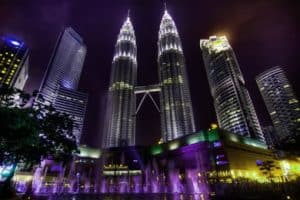Malaysia – a leading investment hub in Asia
KUALA LUMPUR: Last year alone, Malaysia signed a total 14 agreements with China totalling close to RM144 billion ranging from property development, steel manufacturing and technology.
According to Malaysian Prime Minister, Datuk Seri Najib Abdul Razak, the economic trade between the two nations had grown tremendously and was set to expand even further.

Upon completion, the railway link is expected to reduce the transportation costs between the west and east coasts of Peninsular Malaysia and also the price of goods and travelling time.
The Prime Minister said the project would also create more job and business opportunities and also spur the growth of smaller towns along the route.
The giant project will be built in phases, with the first phase from Port Klang to Dungun in Terengganu, followed by Dungun to Tumpat.
Boasting a stable economy with gross domestic growth figures between 4 per cent to 4.5 per cent in 2016, Najib is positive it will continue to grow up to 5 per cent in 2017, further boosting investor confidence and encouraging more investment.
Apart from a strong economic foundation, Malaysia has plenty to offer investors and remains a top destination for foreign investors.
Over the years, a major factor that has continued to draw investors is the government’s commitment in maintaining a sound business environment.
This helps companies to grow, while the government also holds regular government-private sector dialogues to obtain valuable feedback which is used to further improve.
These sessions have helped formulate better government policies to attract more foreign direct investments (FDI) into the country.
Malaysia also has a very liberal equity policy which allows foreign investors to hold 100 per cent of the equity in all investments in new projects. This includes investments in expansion and the diversification of projects.
Also, with regards to the employment of expatriates, Malaysia allows foreign companies in the manufacturing sector with a paid up capital of USD$2 million and above to employ up to 10 expatriates.
One major factor to draw more FDI into any country is the kind of tax incentives offered. Malaysia offers a range of incentives, mainly the Pioneer Status, Investment Tax Allowance, Reinvestment Allowance, Incentives for High Technology Industries and Incentives for Strategic Projects and Incentives for the setting-up of International and Regional Service-based Operations.
Malaysia has over the years been a choice investment destination also because of its quality workforce which has been noted to be the best in this region.
The reason for this is the high literacy rate while education and training have always been given great priority.
Both, the public and private institutions of higher learning churn out a large pool of professionals each year which helps ensure a strong workforce.
The government also launched the Human Resource Development Fund (HRDF) aimed at enhancing training and skills upgrading in the private sector.
The country also enjoys very harmonious industrial relations while the rights and responsibilities of employers and employees are clearly spelt out in Malaysia’s labour laws.
Despite all these incentives already in place, the government continuosly strives to ensure Malaysia remains among the top business desinations.
This is part of the country’s aspiration to achieve a high-income economy by 2020.
In the latest (2016-2017) Global Competitiveness Report released by the Switzerland-based World Economic Forum, Malaysia was ranked 25th out of 138 economies, making it among the world’s top 20 per cent of the most competitive economies.







